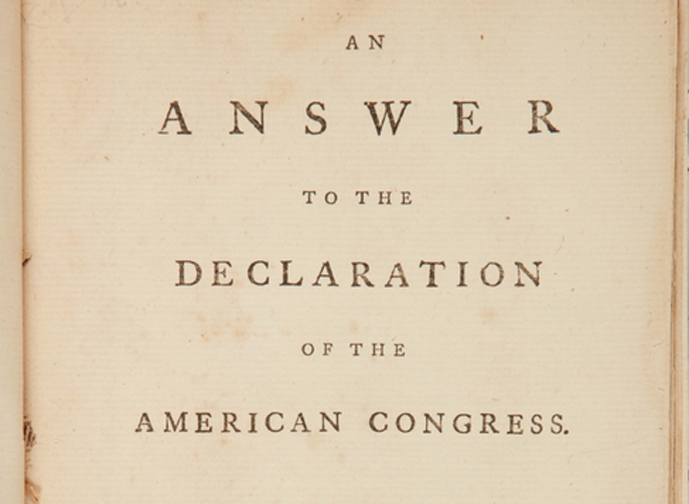Thomas Fletchall was a man of considerable influence in the South Carolina backcountry. Born in Maryland in 1725, Fletchall and his family relocated to South Carolina. By the 1770s, he owned a plantation in the Fairforest Creek region where he served his locality as a justice of the peace, coroner, and militia colonel for the Ninety-Six Precinct.[1] When the Revolution came knocking on his door, Fletchall refused to take up arms against the King. Consequently, he used his influence to rally support for the British during the Revolutionary War.
Fletchall wrote a proclamation declaring support for the following principles: refusal to acknowledge accusations that King George III had violated the rights of colonists; securing the defense of the colony from Indian threats, Slave insurrections, and external enemies; and the refusal of these men to abide by laws not executed by the Statute of Great Britain. In essence, the resolutions outlined in this Proclamation firmly asserted loyalty to the King and to the British government.
The document reads:
South Carolina Between Broad and Saludy River – Whereas the Important Contraversey at the Present Existing between Great Britain and the American Colonies hath Excited, many of our Countreys men, to Enter into Certain resolutions, which we Do not Think is our Duty to assent unto; Therefore upon mature deliberation it is our Opinions and ultimate resolutions, Touching the aforesaid Contraversey, That our Sovereign Lord King George the Third of Great Britain etcetera: has not acted inconvenient and with and Subversive of the Principles of the Constitution of the British Empire at Least at present, that we have seen no Authority Sufficient or Testimony Authenticated to Convince us thereof to Such a Degree as to forfeit his right to our Allegiance Wherefore we are Determined not to take up arms against him But bear True Allegiance as formerly, and our Diversity of Opinion Touching the Aforesaid Contraversey Ariseth from our Different Degrees of Capacity, and the means of Information We Resolve to Live in peace and True Friendship, with the rest of our Countrymen, not with Standing the aforesaid Deversity of Opinion, and Ready and willing at all Times to assist in Defending the Province, in order to oppose and Suppriss The Inserusions [Intrusions] of Indians, Insurrections of Negroes, or any other Enemy which may or shall Invade This Province or undoufully Disturb the Good People Thereof, and That without any reason whatsoever, when the Exegeiencys [Exigency’s] of the Cause & Condition of our Province require it, or are Called upon by a Lawful officer of said Province; Moreover That no Laws be Executed amongst us But the Statute of Great Britain which are of force here, And the Acts of the General Assembley of This Province; In Testimon[y] Whereoff we have subscribed our Names to This Memorial of our Resolutions[2]
The proclamation was signed by 109 men. Halfway through the signatures, a sentence reads, “and Sixty two Names more Not yet put Down here but in a Levy sent away,” indicating that some supporters had been sent off for military service before having an opportunity to sign. If this was accurate, the total number of men who signed off on this agreement was 171, not including Thomas Fletchall himself.
This document shows the commitment South Carolina loyalists had towards the British effort of maintaining a hold on the colonies. Indeed, by signing their names to this association, they had renounced their ties to the rebellion, thus making them targets and enemies to the Revolutionary movement. Had this document fallen into the wrong hands, Patriots could use it to track down and punish the men whose names were on it.
Associations such as these played a role in upholding to the British government the illusion that the majority of colonists were loyal, and the rebellion was generally unpopular. The British southern strategy pursued in the latter half of the war relied heavily on loyalist support and participation. In spite of the tangible evidence that proclamations like Fletchall’s provided, evidence which convinced and motivated British leadership to make the decisions necessary which would inevitably influence and shape their wartime strategy, the reality of war in the southern colonies did not favor the British cause.
As for what became of Fletchall, his political loyalties eventually cost him his very existence in the thirteen colonies. After the major Loyalist defeat at King’s Mountain in October, 1780, and following a weakened loyalist state in the province resulting from this action, death threats were sent to Fletchall’s home from his Whig neighbors. In response to this, the family decided to flee to the safety of British controlled Charleston, all but abandoning the Fletchall estates which would, in their entirety, be confiscated by the rebels. The family remained in Charleston until December, 1782. From there they relocated to Jamaica, alongside various other loyalist refugees, where Fletchall would live out the rest of his days until his death in 1789.[3]
[1]Phil Norfleet, “Colonel Thomas Fletchall,” The American Revolution in South Carolina, www.carolana.com/SC/Revolution/loyalist_leaders_sc_thomas_fletchall.html.
[2]Subscriber’s to Thomas Fletchall’s Association, July 1775, The American Revolution in South Carolina, South Carolina Library, University of South Carolina.










One thought on “Thomas Fletchall’s Association: A Loyalist Proclamation in the South Carolina Backcountry”
How does one get to the document with the signatures (or transcribed names) who signed? This is genealogical gold. Thank you!